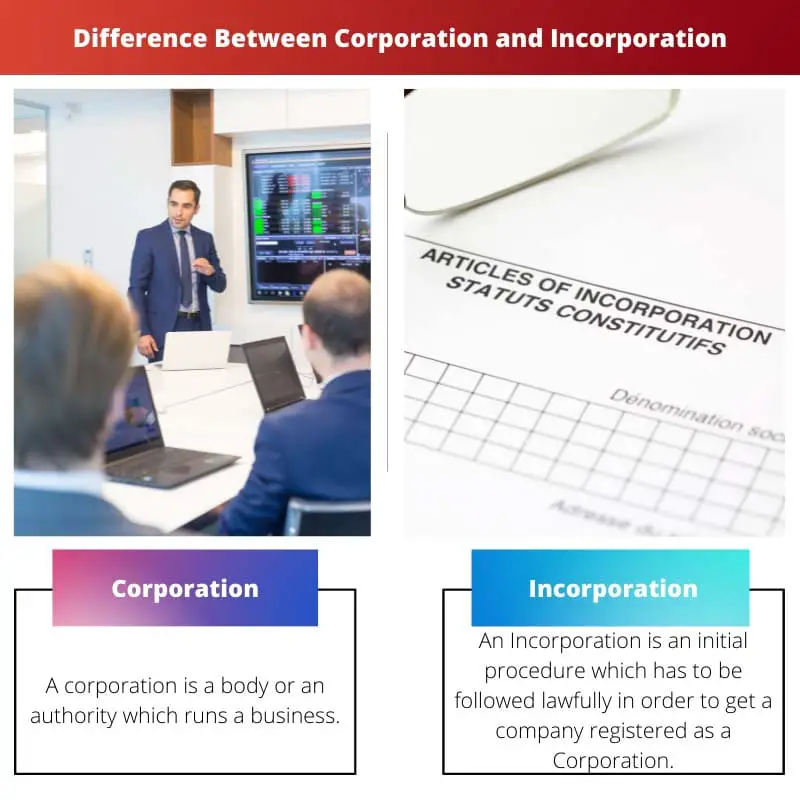“Corporation” refers to an established legal entity that operates as a separate entity from its owners, offering limited liability protection and potential tax benefits. “Incorporation” is the process by which a business becomes a corporation, involving the creation of a legal structure, issuance of shares, and adherence to regulatory requirements, marking the formal establishment of the entity.
Key Takeaways
- A corporation refers to a legal entity distinct from its owners, providing limited liability and facilitating the ownership of shares, while incorporation describes the process of forming such an entity.
- Incorporation involves registering a business with the appropriate government authority, creating a legal structure for tax purposes, and protecting personal assets from business liabilities.
- Corporations can exist in various forms, such as public, private, and nonprofit, offering different levels of control and management structures. In contrast, incorporation serves as the initial step to establishing a corporation.
Corporation vs Incorporation
A corporation refers to a legal entity separate from its owners or shareholders, has its rights and obligations, and can enter into contracts, own property, and sue or be sued. Incorporation refers to forming a corporation and providing the business with a legal framework.

A corporation has the full right and says in matters of Administrative importance of an organisation, e.g. salary, staff, decisions related to provident funds, etc.
It is the second step, as the initial step is incorporating the business.
The procedure followed legally to establish a company is known as Incorporation. The short form of Incorporation is ‘Inc.’
Incorporation denotes the legal status of a company or business organisation. Incorporation comprises its initial functions.
A business can use Inc./Corp. Abbreviation after its name as per its choice. Although, after getting registered, the business must ensure to use only that extension for all the work related to the legal domain.
Comparison Table
| Feature | Corporation | Incorporation |
|---|---|---|
| Definition | A legal business entity separate from its owners | The act of forming a corporation |
| Outcome | A formally established business with specific legal rights and responsibilities | Creates a corporation as a separate legal entity |
| Key feature | Limited liability protection for owners | Sets the foundation for limited liability and other benefits |
| Process | Requires filing legal documents and following specific regulations | Initiates the process of forming a corporation |
| Ownership | Owned by shareholders | Doesn’t directly determine ownership structure |
| Management | Governed by a board of directors and officers | Doesn’t determine management structure |
| Taxation | Typically taxed as a C corporation or S corporation | Doesn’t determine tax structure |
What is Corporation?
A corporation is a legal entity that is separate and distinct from its owners (shareholders), allowing it to conduct business, enter into contracts, incur liabilities, and pursue legal actions in its own name. Corporations can be formed for various purposes, including for-profit ventures, non-profit organizations, and government agencies.
Characteristics of a Corporation
- Limited Liability: One of the key features of a corporation is limited liability, which means that the shareholders’ liability is limited to the amount they have invested in the corporation. This shields individual shareholders from personal liability for the corporation’s debts and obligations.
- Perpetual Existence: Unlike sole proprietorships or partnerships, which may dissolve upon the death or withdrawal of an owner, a corporation has perpetual existence. Its life is not dependent on the lives of its shareholders, directors, or officers. This ensures continuity of operations and facilitates long-term planning.
- Transferability of Ownership: Shares of a corporation’s stock can be bought, sold, or transferred freely, subject to any restrictions outlined in the corporation’s bylaws or shareholder agreements. This allows for easy transfer of ownership interests and liquidity for shareholders.
- Centralized Management: Corporations are managed by a board of directors elected by the shareholders. The board appoints officers who are responsible for day-to-day operations. This separation of ownership and management helps ensure efficient decision-making and accountability.
- Access to Capital: Corporations have various options for raising capital, including issuing stocks, bonds, or obtaining loans from financial institutions. This access to capital allows corporations to undertake large-scale projects, expand operations, or invest in research and development.
- Taxation: Depending on the jurisdiction and corporate structure, corporations may be subject to corporate income tax on their profits. However, they may also benefit from certain tax advantages, such as deductions for business expenses and the ability to defer taxes on retained earnings.
- Legal Formalities: Corporations must comply with various legal formalities, including registration with government authorities, filing annual reports, holding shareholder meetings, and maintaining accurate financial records. Failure to adhere to these requirements can result in penalties or loss of legal protections.

What is Incorporation?
Incorporation is the legal process of forming a corporation, whereby a business entity is established as a separate legal entity from its owners (shareholders). This process involves filing the necessary documents and fulfilling regulatory requirements to obtain recognition as a corporation under the law.
Steps Involved in Incorporation
- Name Reservation: The first step in the incorporation process is choosing and reserving a unique name for the corporation. The name must comply with the rules and regulations of the jurisdiction where the corporation is being formed. Typically, this involves ensuring that the chosen name is not already in use by another business entity and meets any specific naming requirements.
- Drafting Articles of Incorporation: The next step involves drafting and filing the articles of incorporation, also known as the corporate charter or certificate of incorporation. These documents outline essential information about the corporation, including its name, purpose, registered agent, initial directors, and the number and types of shares authorized for issuance.
- Filing with Government Authorities: Once the articles of incorporation are prepared, they must be filed with the appropriate government authority, the Secretary of State’s office or a similar agency. Along with the articles, the corporation may need to submit additional documents and pay filing fees as required by law.
- Appointment of Directors and Officers: After the articles of incorporation are filed and approved, the initial board of directors is appointed. The directors are responsible for overseeing the corporation’s affairs and making key decisions on behalf of the shareholders. Additionally, officers such as the president, treasurer, and secretary may be appointed to handle day-to-day management and operations.
- Issuance of Shares: As part of the incorporation process, the corporation may issue shares of stock to its initial shareholders. These shares represent ownership interests in the corporation and may entitle shareholders to certain rights, such as voting rights and dividends. The issuance of shares must comply with applicable securities laws and regulations.
- Compliance with Legal Requirements: After incorporation, the corporation must comply with various legal requirements, including holding shareholder meetings, maintaining corporate records, filing annual reports, and paying taxes. Failure to meet these obligations could result in penalties or loss of legal protections.

Main Differences Between Corporation and Incorporation
- Definition:
- Corporation: A legal entity created by individuals, stockholders, or shareholders, which is distinct from its owners and has its own legal rights and obligations.
- Incorporation: The process of legally forming a corporation, wherein a business becomes a separate legal entity under the law.
- Legal Status:
- Corporation: A fully formed legal entity with rights and responsibilities, capable of entering contracts, owning assets, and being sued.
- Incorporation: The act of establishing a corporation, which involves filing specific documents with the appropriate government authority.
- Ownership Structure:
- Corporation: Typically owned by shareholders who hold shares of stock, with ownership represented by the number of shares held.
- Incorporation: Incorporation is the initial step in establishing a corporation; it involves drafting and filing articles of incorporation with the state government.
- Liability:
- Corporation: Shareholders’ liability is limited to the amount they have invested in the company.
- Incorporation: The process of incorporation helps to shield owners’ personal assets from business liabilities, as the corporation is considered a separate legal entity.
- Taxation:
- Corporation: Subject to corporate income tax on profits, and shareholders may also face taxes on dividends received.
- Incorporation: The act of incorporation itself does not directly affect tax treatment, but it establishes the legal framework for the corporation’s tax obligations.
- Formation Requirements:
- Corporation: Requires drafting and filing articles of incorporation, appointing directors, issuing stock, and fulfilling other legal requirements set by the state.
- Incorporation: The formal process of establishing a corporation by fulfilling legal requirements laid out by the state, such as registering the company name, appointing directors, and filing necessary documents.
- Continuity:
- Corporation: Generally has perpetual existence, meaning it continues to exist even if ownership changes or shareholders die.
- Incorporation: Once incorporated, the corporation exists independently of its founders and can continue its operations indefinitely, unless dissolved voluntarily or by regulatory action.
- Regulatory Compliance:
- Corporation: Subject to various regulations and reporting requirements imposed by state and federal governments, including annual filings, tax returns, and shareholder meetings.
- Incorporation: The act of incorporation initiates the corporation’s legal existence and places it under regulatory oversight, necessitating compliance with laws and regulations governing corporations.
- Purpose:
- Corporation: Often formed to conduct business, own assets, and pursue profits while providing limited liability protection to its owners.
- Incorporation: The initial step in establishing a corporate entity, enabling the business to operate with legal recognition and protection.





